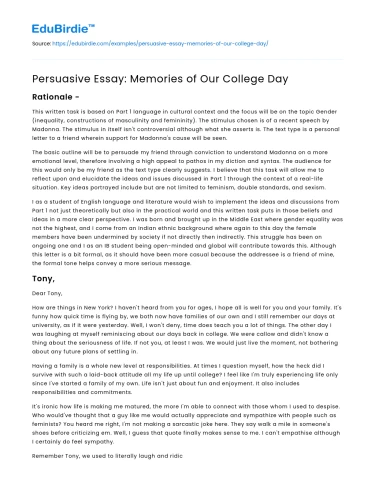Introduction
College days are often heralded as some of the most transformative years in an individual's life, serving as a crucible where personalities are molded, lifelong friendships are forged, and intellectual capacities are expanded. The memories created during this time are not merely recollections of past events but are instrumental in shaping one’s identity and future endeavors. These cherished moments, whether rooted in academic achievements or social interactions, play a pivotal role in defining who we are. As we delve into these memories, it becomes imperative to understand their lasting impact, not just on personal development, but also on our societal contributions. This essay posits that the memories of our college days are indispensable, offering profound insights into our personal and professional lives and underscoring the need to cherish and learn from these experiences.
Academic Achievements: A Foundation for Future Success
The academic rigor experienced during college years forms a significant portion of the memories that students carry with them. The late-night study sessions, the thrill of intellectual discovery, and the satisfaction of mastering complex subjects are indelible parts of the student experience. According to a study by Pascarella & Terenzini (2005), the cognitive skills honed during college are critical to professional success, providing a strong foundation for problem-solving and critical thinking. These academic memories are not just about the acquisition of knowledge; they are about the perseverance and discipline that students cultivate. For instance, the successful completion of a challenging project or research paper often serves as a testament to a student's capability to tackle future professional challenges. However, some argue that academic achievements alone do not define college experiences. Critics highlight that the pressure to excel academically can overshadow the broader educational experience, potentially leading to stress and burnout. Despite this, it is undeniable that the intellectual growth and confidence gained through academic endeavors are invaluable. Such experiences not only prepare students for their chosen careers but also instill a lifelong love for learning and inquiry.
Save your time!
We can take care of your essay
- Proper editing and formatting
- Free revision, title page, and bibliography
- Flexible prices and money-back guarantee
Social Interactions: Building Networks and Emotional Intelligence
Beyond academics, the social landscape of college life significantly contributes to the memories that students cherish. The friendships and social networks developed during this period often extend beyond the college years, offering emotional support and professional opportunities. As noted by Granovetter (1973) in his seminal work on social networks, the connections formed in college can be crucial in accessing information and resources in one's career. These social interactions also play a critical role in developing emotional intelligence, a key factor in personal and professional success. Engaging in diverse social circles enables students to understand different perspectives, fostering empathy and communication skills. While some may argue that the focus on social life can detract from academic responsibilities, it is important to recognize that these interactions are a vital component of holistic education. The balance between academic and social pursuits often leads to a more rounded and adaptable individual, capable of thriving in various environments.
Extracurricular Activities: Fostering Personal Growth and Leadership
Participation in extracurricular activities is another significant aspect of college life, contributing to the rich tapestry of memories that students carry forward. Whether through sports, arts, or student organizations, these activities provide a platform for personal growth and leadership development. According to Astin (1999), involvement in extracurricular activities is positively correlated with student retention and success, as these activities enhance students' sense of belonging and commitment to their institution. Furthermore, they offer practical experiences that are often not available in the classroom, such as teamwork, time management, and leadership skills. These experiences are instrumental in preparing students for the complexities of the real world. Critics may argue that excessive involvement in extracurricular activities can detract from academic focus. However, the skills and experiences gained from these activities often complement academic learning, reinforcing the practical application of theoretical knowledge. Ultimately, participation in extracurricular pursuits enriches the college experience, providing students with the tools necessary for future success and fulfillment.
Conclusion
In conclusion, the memories of our college days are far more than mere nostalgic reflections; they are a testament to the formative experiences that shape our personal and professional trajectories. The academic, social, and extracurricular dimensions of college life collectively contribute to a well-rounded and enriched individual. While there are debates regarding the emphasis placed on each aspect, it is clear that these experiences are integral to developing a comprehensive skill set and a resilient identity. As we reflect on these memories, it becomes evident that they hold the key to understanding our potential and driving our contributions to society. Cherishing these moments, therefore, is not only about reminiscing but also about recognizing their enduring impact on our lives. As we move forward, let us continue to draw inspiration and lessons from our college days, ensuring that they remain a guiding force in our journey towards personal and professional fulfillment.






 Stuck on your essay?
Stuck on your essay?

